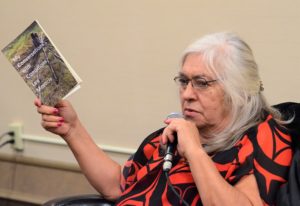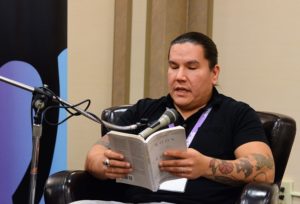Just keep writing: the time is now for Indigenous writers

By Laura E. Young
SUDBURY – For Lee Maracle, the Truth and Reconciliation Commission (TRC) may have created an appeal and focused renewed attention on Indigenous writers.
Maracle was a featured author, one of five Indigenous writers who formed part of the fabric of creative souls at the fifth edition of Wordstock, Sudbury’s Literary Festival, November 1-3.
Indigenous writers Waub Rice, Mahlikah Awe:ri, Tom Wilson, and Darlene Naponse joined Maracle in the three-day festival of creativity on the written and oral fronts.
The TRC’s work has unleashed a flood of young, Indigenous writers, says Maracle, author of Sundogs, Ravensong, Sojourner’s Truth and Other Stories, and instructor of the Aboriginal Studies program at the University of Toronto.
“If you go to college, you have to study me, the writers of the 70s and 80s, Maria Campbell and Half Breed Beatrice Culleton, who is the least honoured Aboriginal person but the most sold, with In Search of April Raintree. It’s still relevant today because the 60s Scoop is just getting settled now,” Maracle says.
Maracle’s extension writings also informed Rice’s work. Maracle and Rice shared the conversation on the Friday night panel, Minwaajimo: Tell a Good Story.
Rice, also the host of CBC Northern Ontario’s Up North Afternoon show, had his latest novel, Moon of the Crusted Snow, published in October.
In high school, Rice enjoyed writing and one of Rice’s aunts took note. She gifted him with books by Indigenous authors like Maracle and Richard Wagamese.
“It totally opened my eyes and blew my mind that there were Indigenous people out there sharing their truths and connecting with other Indigenous people through the written word.”
He had not been exposed to them in the formal education system.
“The book is held up as the pinnacle of creativity or artwork, but they weren’t teaching us about any of the Indigenous people who were creating books. You feel in that sense that’s not a viable outlet, that nobody believes that’s what my people can do.”
It was noted during Wordstock that it’s an exciting time in Canadian literature.
Formally marginalized groups are in the vanguard swell of much needed change, said Diane Schoemperlen, Governor General Award winner for English Fiction, who hosted Wordstock’s short fiction class.
Canadians need to read male and female Indigenous writers to have a full perspective for Maracle.
“The men tell what happened, but if Canadians want to know who we are, then they have to read the women. We’re mostly killed. That’s how Canadians feel about Indigenous women. That’s got to change.”

Maracle is looking to move back to British Columbia and work as a fulltime writer. In 2019, she will mark a personal and professional achievement with the publication of Hope Matters. Maracle wrote the collection of poems with her daughters Columpa Bobb and Tania Carter, who also painted the book’s cover.
Rice is currently developing a nonfiction project with ECW Press and is “chipping away” at some short stories.
Regardless of who is doing the writing, the advice remains the same. Just keep writing, even if you don’t think it’s good.
“Just the process is what begets more in the end,” Rice says.
“I put it in a box and save it, then I think about it, what the characters really want to do, then they somehow tell you,” Maracle says.

